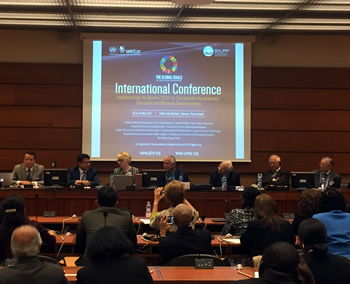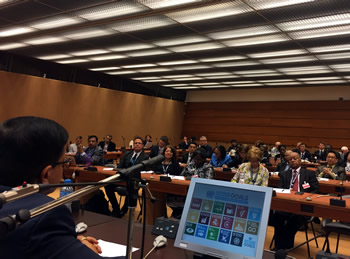Implementing the Agenda 2030 for Sustainable Development: Education and National Transformation
 15 June 2017, Geneva, Switzerland – In partnership with Global Hope Network International (GHNI), UNITAR co-hosted the 7th Annual Conference of the Geneva Institute for Leadership and Public Policy (GILPP), held at the United Nations European Headquarters (the Palais des Nations) and the Centre International de Conférences Genève (CICG) on 16-19 May, 2017. GHNI, a Geneva-based NGO in Special Consultative Status with the UN Economic and Social Council (ECOSOC), was founded by retired U.S. Senator Harold Jones to “bring help and hope to the hidden and the hurting”, and helps foster sustainable development programmes in communities across Africa, Asia, and the Middle East. The GILPP was established by Global Hope to help train leaders and policy makers on critical contemporary global issues, equipping them to return to their countries and help fight for positive transformation in the public sphere. The Annual Conference looks towards the creation of improved public policy in nations and locales around the globe: policy driven by compassion and that seeks the wellbeing of those left furthest behind.
15 June 2017, Geneva, Switzerland – In partnership with Global Hope Network International (GHNI), UNITAR co-hosted the 7th Annual Conference of the Geneva Institute for Leadership and Public Policy (GILPP), held at the United Nations European Headquarters (the Palais des Nations) and the Centre International de Conférences Genève (CICG) on 16-19 May, 2017. GHNI, a Geneva-based NGO in Special Consultative Status with the UN Economic and Social Council (ECOSOC), was founded by retired U.S. Senator Harold Jones to “bring help and hope to the hidden and the hurting”, and helps foster sustainable development programmes in communities across Africa, Asia, and the Middle East. The GILPP was established by Global Hope to help train leaders and policy makers on critical contemporary global issues, equipping them to return to their countries and help fight for positive transformation in the public sphere. The Annual Conference looks towards the creation of improved public policy in nations and locales around the globe: policy driven by compassion and that seeks the wellbeing of those left furthest behind.
This year, UNITAR was pleased to join forces with Global Hope, and to co-host this year’s Conference focused on Education and National Transformation. In the UN’s 2030 Agenda, Sustainable Development Goal 4 acknowledges that a quality education is foundational to improving quality of life; and, as such, educational policy-making is a critical component for fostering the prosperity and wellbeing of individuals and nations. Participants from all over the world explored questions related to the future of education, and specifically how education policy can and should be further leveraged for poverty alleviation and sustainable development. UNITAR Executive Director and UN Assistant Secretary-General Nikhil Seth opened the three-day workshop, and was followed by 24 expert speakers and facilitators addressing a broad spectrum of issues related to education and development policy. Plenary sessions and break-out groups explored the themes of values and ethics in public policy, anti-corruption initiatives, peacemaking and reconciliation, small-business development, and knowledge transfer for rural poverty transformation, among others. In addition, the conference featured experts and practitioners who discussed the national education systems of a diverse range of countries: Bahrain, Kenya, Nigeria, the Philippines, Romania, Singapore, Switzerland, and Uganda.
 Delegates and attendees were selected on the basis of their demonstrated commitment to fighting extreme poverty in their countries, and comprised high-level government officials, policy-makers, and civil-society practitioners of over 20 nationalities. The intensive experience, inaugurated in the Palais des Nations and continued at the CICG, led to a wealth of knowledge exchange and interaction amongst these diverse and influential actors over the course of the week. The gathering provided a forum for sharing best practices and served as a catalyst for creative new solutions in education and development policy, across sectors, nations, and continents. In co-organizing the GILPP Conference, UNITAR and GHNI sought to leave each policy-maker and participant able to return home and leverage new knowledge gained in Geneva, rendering them better equipped to serve their nations, to reach the poorest of the poor, and to advance the cause of sustainable development worldwide.
Delegates and attendees were selected on the basis of their demonstrated commitment to fighting extreme poverty in their countries, and comprised high-level government officials, policy-makers, and civil-society practitioners of over 20 nationalities. The intensive experience, inaugurated in the Palais des Nations and continued at the CICG, led to a wealth of knowledge exchange and interaction amongst these diverse and influential actors over the course of the week. The gathering provided a forum for sharing best practices and served as a catalyst for creative new solutions in education and development policy, across sectors, nations, and continents. In co-organizing the GILPP Conference, UNITAR and GHNI sought to leave each policy-maker and participant able to return home and leverage new knowledge gained in Geneva, rendering them better equipped to serve their nations, to reach the poorest of the poor, and to advance the cause of sustainable development worldwide.
Photos: Panelists and participants

